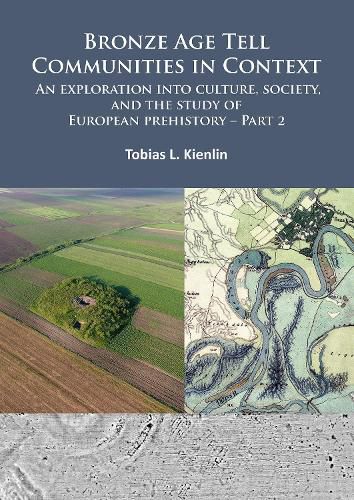Readings Newsletter
Become a Readings Member to make your shopping experience even easier.
Sign in or sign up for free!
You’re not far away from qualifying for FREE standard shipping within Australia
You’ve qualified for FREE standard shipping within Australia
The cart is loading…






Practice - The Social, Space, and Materiality forms the second part of Bronze Age Tell Communities in Context: An exploration into culture, society, and the study of European prehistory. It studies Bronze Age tells and our approaches towards an understanding of this fascinating way of life, drawing on the material remains of long-term architectural stability and references back to ancestral place. While the first volume challenged Neo-Diffusionist models of the influence of Mediterranean palatial centres on the development of tell communities in the Carpathians and an attendant focus on social stratification, the second part sets out an alternative theoretical approach, which foregrounds architecture and the social use of space. Unlike the reductionist macro perspective of mainstream social modelling, inspired by aspects of practice theory outlined in this book, the account given seeks to allow for what is truly remarkable about these sites, and what we can infer from them about the way of life they once framed and enabled. The stability seen on tells, and their apparent lack of change on a macro scale, are specific features of the social field, in a given region and for a specific period of time. Both stability and change are contingent upon specific historical contexts, including traditional practices, their material setting and human intentionality. They are not an inherent, given property of this or that ‘type’ of society or social structure. For our tells, it is argued here, underneath the specific manifestation of sociality maintained, we clearly do see social practices and corresponding material arrangements being negotiated and adjusted. Echoing the argument laid out in the first part of this study, it is suggested that archaeology should take an interest in such processes on the micro scale, rather than succumb to the temptation of neat macro history and great narratives existing aloof from the material remains of past lives.
$9.00 standard shipping within Australia
FREE standard shipping within Australia for orders over $100.00
Express & International shipping calculated at checkout
Practice - The Social, Space, and Materiality forms the second part of Bronze Age Tell Communities in Context: An exploration into culture, society, and the study of European prehistory. It studies Bronze Age tells and our approaches towards an understanding of this fascinating way of life, drawing on the material remains of long-term architectural stability and references back to ancestral place. While the first volume challenged Neo-Diffusionist models of the influence of Mediterranean palatial centres on the development of tell communities in the Carpathians and an attendant focus on social stratification, the second part sets out an alternative theoretical approach, which foregrounds architecture and the social use of space. Unlike the reductionist macro perspective of mainstream social modelling, inspired by aspects of practice theory outlined in this book, the account given seeks to allow for what is truly remarkable about these sites, and what we can infer from them about the way of life they once framed and enabled. The stability seen on tells, and their apparent lack of change on a macro scale, are specific features of the social field, in a given region and for a specific period of time. Both stability and change are contingent upon specific historical contexts, including traditional practices, their material setting and human intentionality. They are not an inherent, given property of this or that ‘type’ of society or social structure. For our tells, it is argued here, underneath the specific manifestation of sociality maintained, we clearly do see social practices and corresponding material arrangements being negotiated and adjusted. Echoing the argument laid out in the first part of this study, it is suggested that archaeology should take an interest in such processes on the micro scale, rather than succumb to the temptation of neat macro history and great narratives existing aloof from the material remains of past lives.